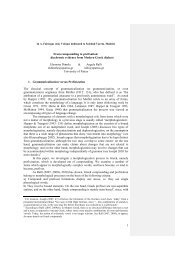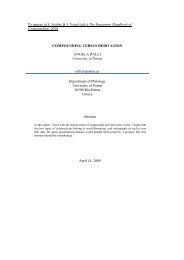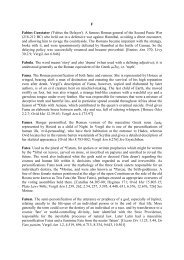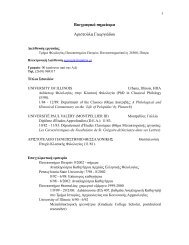Case mismatches in Greek: Evidence for the autonomy of morphology
Case mismatches in Greek: Evidence for the autonomy of morphology
Case mismatches in Greek: Evidence for the autonomy of morphology
You also want an ePaper? Increase the reach of your titles
YUMPU automatically turns print PDFs into web optimized ePapers that Google loves.
196 manuel espaol-echevarra and angela ralli<br />
<strong>Greek</strong> <strong>of</strong> an <strong>in</strong>herent Dative <strong>Case</strong> (cf. footnote 5) checked by <strong>the</strong> verb <strong>in</strong> <strong>the</strong><br />
free relative, attraction by <strong>the</strong> matrix <strong>Case</strong>, as <strong>in</strong> <strong>the</strong> ungrammatical example<br />
<strong>in</strong> (23), cf. (15cd), would entail <strong>in</strong> m<strong>in</strong>imalist terms that <strong>the</strong> <strong>in</strong>herent <strong>Case</strong><br />
feature checked <strong>in</strong> <strong>the</strong> free relative is erased, which is presumably <strong>in</strong>compatible<br />
with <strong>the</strong> <strong>in</strong>herent nature <strong>of</strong> <strong>the</strong> Dative case. 18<br />
(23) (a) *Opjos dosume to vravio, tha j<strong>in</strong>i diasimos<br />
whoever-nom give-perf-1pl <strong>the</strong> prize, fut become-perf-3sg famous<br />
`Whoever we give <strong>the</strong> prize will become famous' (cf. (7b))<br />
(b) *Opjon dosume to vravio, i Anna tha ton proslavi<br />
whoever-acc give-perf-1pl <strong>the</strong> prize, <strong>the</strong> Anna fut him(cl)-acc-hire<br />
`Whoever we give <strong>the</strong> prize, Anna will hire him'<br />
However, <strong>the</strong>re is no strong evidence support<strong>in</strong>g <strong>the</strong> <strong>in</strong>herent status <strong>of</strong> Dative<br />
case (morphologically genitive) <strong>in</strong> Modern <strong>Greek</strong>. Fur<strong>the</strong>rmore, <strong>the</strong>re seems to<br />
be evidence <strong>for</strong> <strong>the</strong> contrary. If <strong>the</strong> Genitive ontu orfanotrou '<strong>the</strong> orphanage'<br />
was <strong>the</strong> morphological expression <strong>of</strong> an <strong>in</strong>herent Dative <strong>in</strong> (24), we would<br />
expect this <strong>Case</strong> mark<strong>in</strong>g to be preserved <strong>in</strong> <strong>the</strong> nom<strong>in</strong>alized counterpart. The<br />
ungrammaticality <strong>of</strong> (24b) shows that this expectation is not fullled: 19<br />
(24) (a) Dosame tu orfanotrou polla ruha<br />
gave-perf-1pl <strong>the</strong>-gen orphanage-gen many clo<strong>the</strong>s<br />
(b) *I dorea tu orphanotrou (under a non-possessive <strong>in</strong>terpretation)<br />
<strong>the</strong> gift <strong>the</strong>-gen orphanage-gen<br />
18<br />
The assumption that <strong>in</strong>herent <strong>Case</strong> cannot be erased is supported by <strong>the</strong>typical behavior<br />
<strong>of</strong> <strong>in</strong>herently <strong>Case</strong> marked constituents under passivization, as <strong>in</strong> <strong>the</strong> examples<br />
<strong>in</strong> (i) show<strong>in</strong>g that dative case <strong>in</strong> German is reta<strong>in</strong>ed under passivization:<br />
19<br />
(i) a. *er wird geholfen<br />
he-nom is helped<br />
b. ihm wird geholfen<br />
he-dat is helped cf. Belletti (1988)<br />
The fact that <strong>in</strong>herent case features cannot be erased from syntactic derivations be<strong>for</strong>e<br />
Spell-Out does not necessarily imply that <strong>the</strong>y are +Interpretable features. We would<br />
like to claim that it is <strong>the</strong> -relation <strong>the</strong> <strong>in</strong>herent <strong>Case</strong> is associated with, and not <strong>the</strong><br />
<strong>Case</strong> feature per se, which is +Interpretable.<br />
It may be <strong>the</strong> case that <strong>the</strong> licens<strong>in</strong>g <strong>of</strong> Dative arguments <strong>in</strong>volves both <strong>in</strong>herent and<br />
structural cases, along <strong>the</strong> l<strong>in</strong>es suggested <strong>in</strong> Torrego (1998). This would account <strong>for</strong><br />
<strong>the</strong> ungrammaticality <strong>of</strong><strong>the</strong> nom<strong>in</strong>alized counterpart where <strong>the</strong> hypo<strong>the</strong>tical structural<br />
case could not be checked. We will not consider this possibility <strong>in</strong> this paper.<br />
Acta L<strong>in</strong>guistica Hungarica 47, 2000










